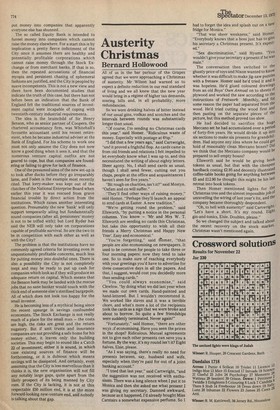Austerity Christmas
Bernard Hollowood
All of us in the bar parlour of the Grapes agreed that we were approaching a Christmas of austerity. Mr Wilson had warned us to expect a definite reduction in our real standard of living and we all knew that the new year would bring in a regime of higher tax demands, soaring bills and, in all probability, more redundancies.
So we were drinking halves of bitter instead of our usual gins, vodkas and scotches and the intervals between rounds was substantially longer than usual.
"Of course, I'm sending no Christmas cards this year," said Homer. "Ridiculous waste Of money. Especially with postage at 61/2p."
"I did that a few years ago," said Cartwright, "and it proved a frightful flop. As cards came in from old friends and relations I felt impelled to let everybody know what I was up to, and this necessitated the writing of about eighty letters. Sheer agony. No, I shall send cards as usual, though I shall send fewer, cutting out you chaps, people at the office and acquaintances I haven't seen for five years."
"Bit rough on charities, isn't it?" said Mostyn. "Oxfam and co will suffer."
"They'll find other ways of raising money," said Homer. "Perhaps they'll launch an appeal • to send cards at Easter. A new tradition."
"We're getting round the problem," said Ellsworth, "by putting a notice in the personal columns. You know — 'Mr and Mrs W. T. Ellsworth are sending no cards this Christmas, but take this opportunity to wish all their friends a Merry Christmas and Happy New Year'. Easy and economical."
"You're forgetting," said Itomer, "that people are also economising on newspapers. It used to be common for people to take three or 'four morning papers: now they tend to take. one. So to make sure of reaching everybody with your greetings you'd have to advertise for three consecutive days in all the papers. And that, I suggest, would cost you decidedly more than sending cards."
"You could always economise," said Clewlow, "by doing what we did last year when we made our own cards. Hand-painted and hand-lettered. But I wouldn't recommend it. We worked like slaves and it was a terrible chore, and what's more a lot of the recipients took the cards as a sign that we were broke and about to borrow. So quite a few friendships were suddenly terminated. Never again!"
"Fortunately," said Homer, "there are other ways of economising. Have you seen the prices in the shops? Ridiculous. Mutual agreements not to give each other presents can save you a fortune. By the way, it's my round isn't it? Eight halves, Elsie, please.
"As I was saying, there's really no need for presents between, say, husband and wife, especially when they're paid for out of a joint banking account."
"I tried that last year," said Cartwright, "and the suggestion was not received with enthusiasm. There was a long silence when I put it to Monica and then she asked me what present I was giving my secretary. Damned awkward, because as it happened, I'd already bought Miss Carstairs a somewhat expensive perfume. So I had to forget the idea and splash out on a new fridge for Monica."
"That was sheer weakness," said Horner' "Everybody knows that a boss just has to give his secretary a Christmas present. It's expect "Sex discrimination," said Hyams. "You wouldn't give your secretary a present if he vies male."
The conversation then switched to the ghastly price of toys and Nixon wanted to know whether it was difficult to make jig-saw puzzles with a fretsaw. Homer said he'd tried it and it was hopeless. He'd glued coloured drawings from an old Boys' Own Annual on to sheets of plywood and worked the saw according to the instructions of Fretwork Monthly, and for some reason the paper had separated from the wood. He'd tried cutting the wood first and then pasting on the separate pieces of the picture, but this method proved too slow.
He had decided to sacrifice the huge Meccano set he had accumulated over a period of forty-five years. He would divide it up int° six sections to make six presents for grandchil' dren. Had anyone any idea where he could get hold of reasonably clean Meccano boxes? Did we think that the Meccano company would be prepared to sell empty boxes?
Ellsworth said he would be giving book tokens as usual, but that with the cheapest hardback costing £2.95 and decently illustrated coffee-table books going for anything between £5 and £12.90 he thought this might be his last retreat into book tokens.
Then Homer mentioned lights for the; Christmas tree and the almost impossible job°1 unravelling the wiring of last year's lot, and the company became thoroughly despondent. "Oh, to hell with austerity!" said Cartwright' "Let's have a short. It's my round. Eight gin-and-tonics, Elsie. Doubles, please."
So we changed the subject and talked about the recent recovery on the stock market. Christmas wasn't mentioned again.

































 Previous page
Previous page